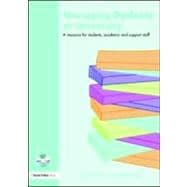
Note: Supplemental materials are not guaranteed with Rental or Used book purchases.
Purchase Benefits
Looking to rent a book? Rent Managing Dyslexia at University: A Resource for Students, Academic and Support Staff [ISBN: 9781843123415] for the semester, quarter, and short term or search our site for other textbooks by Jamieson; Claire. Renting a textbook can save you up to 90% from the cost of buying.
| Foreword | |
| Preface | |
| Acknowledgements | |
| Abbreviations | |
| Dyslexia: Audience: Academic staff, dyslexic students, disability staff, student welfare administration staff, students' union disability representatives | p. 1 |
| What is dyslexia? | |
| Acquired dyslexia | |
| Developmental dyslexia | |
| Dyslexia and intelligence | |
| Dyslexia and spatial ability | |
| Dyslexia as a continuum: the interaction of causes and effects | |
| Late diagnosis | |
| Putting dyslexia in perspective | |
| Other specific learning difficulties | |
| Key points | |
| Assessment and Diagnosis of Dyslexia in Higher Education: Audience: dyslexic students and their parents or family members, disability staff, academic staff | p. 8 |
| The DfES , now DIUS report 2005 | |
| The diagnostic criteria for dyslexia | |
| IQ/attainment discrepancy | |
| Students with English as a second or additional language | |
| When is a reassessment necessary? | |
| What should be assessed? | |
| Which tests should be used? | |
| The assessment process | |
| The recommended format for a diagnostic assessment report | |
| Who is qualified to administer assessments ? | |
| Routes to qualification | |
| The National Committee for Standards in Assessment | |
| Training and Practice (informally known as SASC SpLD Assessment Standards Committee) | |
| Funding and procedures for assessment | |
| The assessment report | |
| Benefits of assessment to previously undiagnosed students | |
| Key points | |
| Dyslexic Students in Higher Education: Audience: dyslexic students and academic staff | p. 17 |
| Students with an existing diagnosis | |
| The changing profile of students in HE | |
| Mature students | |
| Choice of degree subject | |
| Varying demands on literacy skills | |
| Teaching and learning at university | |
| Academic assessment at university | |
| Marking the work of dyslexic students | |
| The Association of Dyslexia Specialists in Higher Education (ADSHE) | |
| Key points | |
| Dyslexia within the Disability Framework: Audience: dyslexic students, disability/dyslexia staff, academic staff | p. 24 |
| The Disability Discrimination Act 1995 (DDA) | |
| Dyslexia as a disability | |
| The dyslexia 'label' | |
| The Disabled Students' Allowances (DSA) | |
| Key points | |
| Dyslexia: Effects and Strategies: Audience: Academic staff, dyslexic students | p. 34 |
| Reading | |
| Writing | |
| Number skiJls | |
| Oral Skills | |
| Examinations | |
| Foreign Languages | |
| Time Management | |
| Key points | |
| Reasonable Adjustments: Audience: dyslexia/disability staff, academic staff, non-academic support staff, dyslexic students | p. 48 |
| Background information | |
| Competence standards | |
| Examples of reasonable adjustments | |
| Placements | |
| Students not in receipt of DSA funding | |
| Key points | |
| Roles and Responsibilities: Audience: dyslexic students, academ ic staff, dyslexia tutors | p. 60 |
| Models of dyslexia and disability services | |
| Accessing support | |
| Who is likely to provide what help? | |
| Responsibilities of the student | |
| International stude nts | |
| Key points | |
| CD and photocopiable resources | p. 69 |
| Student registration document (dyslexia/disability services) | |
| Permission to disclose personal information | |
| Notification of student's registration as dyslexic | |
| Confidential information for academic/library staff | |
| Application for support from the HE Access to Learning Fund (ALF) | |
| ALF application (alternative form ) | |
| Student questionnaire (screening/background to assessment) | |
| Dyslexia tuition record form | |
| Dyslexia tuition evaluation form | |
| References | p. 88 |
| Websites | p. 90 |
| Other resources | p. 92 |
| Index | p. 93 |
| Table of Contents provided by Blackwell. All Rights Reserved. |
The New copy of this book will include any supplemental materials advertised. Please check the title of the book to determine if it should include any access cards, study guides, lab manuals, CDs, etc.
The Used, Rental and eBook copies of this book are not guaranteed to include any supplemental materials. Typically, only the book itself is included. This is true even if the title states it includes any access cards, study guides, lab manuals, CDs, etc.